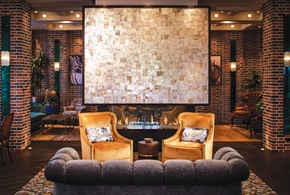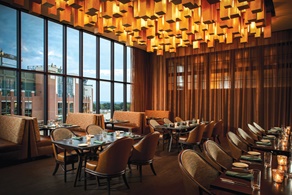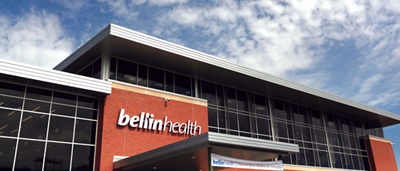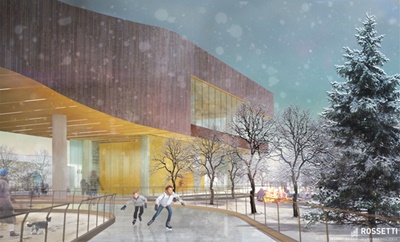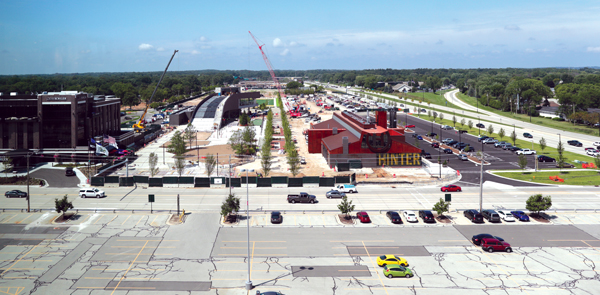 |
On the rise: Lodge Kohler (left) and Hinterland brewery (right) are up and running in Titletown as the tubing hill is being built between them.
Photo by:EVAN SIEGLE / GREEN BAY PACKERS |
For a team that’s a perennial Super Bowl contender, is investing hundreds of millions of dollars in a unique mixed-used development, ranked ninth last season in the NFL in revenue, and boasts a 131,000-person waiting list for season tickets, worrying about staying in town might sound far-fetched.
But if it’s the Green Bay Packers, who play in the smallest market in the NFL, and the league has recently allowed three teams to abandon long-standing homes, it’s not so crazy.
“As we see it now, it really doesn’t appear to be a concern or risk of us leaving, but that can change in the NFL in a hurry,” Packers President Mark Murphy said after the team’s summer shareholders meeting in July. “Maybe we get a [collective-bargaining agreement] with no salary cap, or revenue sharing changes” when the current CBA expires in four years.
Asked about concerns that the NFL would not help teams stay in their markets, Murphy said: “It is something we have to look at carefully. You know you have had in the last year and a half three relocations after 20 years without anything.”
The solution? An audacious club effort to build the cultural and economic base that Green Bay, though long on professional football history and possessing a unique NFL atmosphere, is lacking.
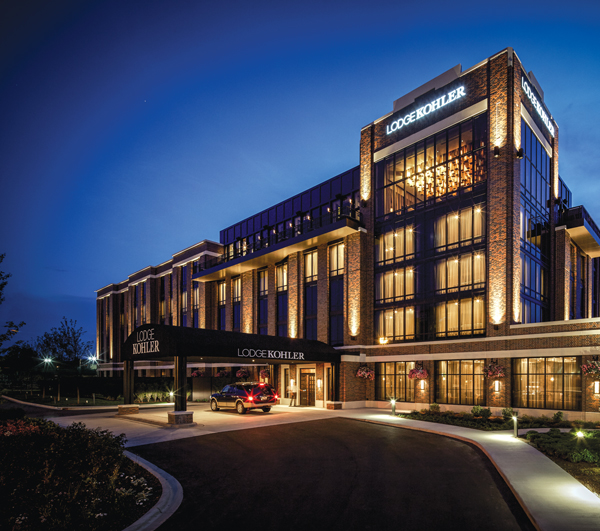 |
The newly opened Lodge Kohler, part of Titletown’s first phase, gives the area its first four-diamond hotel. The lodge mixes luxury with football theming and views of Lambeau Field.
Photo by: KOHLER (3) |
The Packers famously are the only publicly owned team in the NFL, creating a unique bond between the team and the fans and making for festive occasions like the shareholder meeting, but there is no billionaire owner ready to open a big wallet to see the team through an extended down period. It was just 16 years ago that the Packers barely eked out a victory in a sales tax vote allowing for a nearly $300 million renovation of Lambeau Field. Without that narrow victory, the team could have long ago left town.
Building Titletown
■ General contractor: Miron Construction
■ Developer: Sterling Project Development
■ Architect: Rossetti
■ Area: 45 acres
■ Plaza content: Biederman Redevelopment Ventures
Source: Green Bay Packers
Some in the Packers organization privately expressed even greater concern than Murphy about the league’s shifting priorities: They watched as NFL owners in March barely debated allowing the Oakland Raiders to leave for Las Vegas (the discussion and vote lasted an hour), and last year blessed the Rams to leave St. Louis with a debatable stadium proposal on the table.
Most teams that develop commerce around their stadiums, such as the New England Patriots, do so to help finance the venue and generate additional revenue. For the Packers, the new mixed-use Titletown development has taken on broader ambitions. The team doesn’t see the residential, commercial, office and recreational lures necessary to keep the city thriving and the team in Green Bay long term, so the club itself is developing them.
Development to the rescue?
When the Packers five years ago embarked on developing the 45-acre parcel across the street from Lambeau, staying alive in the new NFL did not register. Cleaning up an eyesore did, as well as generating new revenue.
A collection of small bars and businesses littered the lot. One business owner told team general counsel Ed Policy, the executive overseeing the project, to speak to her lawyer when he approached about buying the property. Recalling the conversation this summer while giving a hard hat tour of the site, he said he asked for the attorney’s name, and she replied, “Jesus Christ.” (A lawyer bearing a different name ultimately represented the woman on the sale of her building to the Packers.)
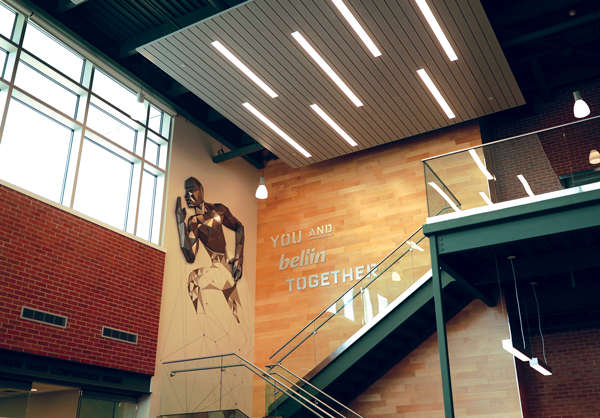 |
Bellin Health hopes its new Green Bay home becomes the Midwest’s top orthopedic center.
Photo by: BELLIN HEALTH (2) |
As Policy was being told he might meet Jesus earlier than he’d expected, the wave of NFL relocations had yet to hit, and a series of old-school owners, in Oakland, Buffalo, Tennessee and Detroit, had yet to pass on.
Fast forward to today, as the first dribble of lease revenue arrives from the initial tenants in Titletown, and it’s clear the team now views the development as something far more than tidying up across the street and acting as a good community partner with some financial upside.
“Some of the research that concerned us when we were starting this process was that Green Bay was at a real disadvantage relative to other communities, similarly sized communities, in the low percentage of college graduates in our community,” Murphy said. “And that translates to a lot of things. You know college graduates earn more money, so the more we can do to bring [and] to keep more college graduates here and bring more college graduates to the community … that is one of the things that Titletown will do for us.”
Asked what there is to see and do in Green Bay beyond the Packers, Murphy mentioned the National Railroad Museum. (“I bet you didn’t know that,” he said of the attraction, which says it draws more than 75,000 visitors annually, slightly less than Lambeau’s listed capacity.)
A short list of attractions is not the only concern; there’s also the limited amount of shopping and services. Residents are known to drive two hours south to Milwaukee to shop at the nearest Whole Foods.
Murphy and Policy won’t tip their hand, but it is clear they have those types of stores in mind for Titletown when the second phase starts to roll next year.
The first three
“This is the best corner in all of Wisconsin,” said Bill Tressler, owner of Hinterland, the 24,000-square-foot microbrewery that in April became the first tenant to open in Titletown, as he motioned out to the intersection that hugs one side of Lambeau.
A park is spreading on one side of his building, and on the other end of that green space is the recently opened Lodge Kohler, the first AAA four diamond hotel in Green Bay.
A Green Bay native, Tressler fell in love with beer while editing a trade magazine about the business in California. He moved back with his wife and opened a microbrewery in downtown Green Bay, three miles from his current perch. (The Packers long term have talked about building toward the downtown to highlight that corridor.)
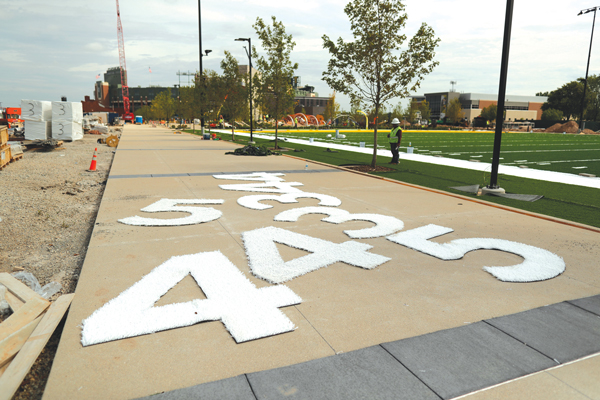 |
For the Packers, the Titletown numbers add up as a way to make Green Bay a sustainable home for a successful NFL franchise.
Photo by: GREEN BAY PACKERS |
 |
Titletown has its own logo, separate from the team’s.
|
He reels off the businesses that were in the Titletown parcel before he arrived: two gas stations, a strip mall, laundromat, a fast-cash outlet, and a liquor store. “It was the worst zoning job in the world,” Tressler said. All have been bought out by the Packers, who have thus far spent $130 million on land, businesses and homes.
As the land owners, the teams is handling lease talks. The Packers’ Policy, son of former 49ers and Browns executive Carmen Policy, approached Tressler in February 2012. Tressler, who struggled at times in downtown Green Bay, bought in right away, and kept asking when Titletown would open as the Packers’ executive laboriously bought out the homes and businesses that filled and surrounded the space.
Tressler saw the immediate attraction of aligning with the Packers, at least in terms of proximity and location inside a parcel with the Titletown moniker (the Packers brand will not be prominent in the district, which has its own logo).
In just its first few months open, Hinterland is doing four times the business it won in Green Bay’s downtown, Tressler said. And he pointed out that’s before the opening later this year of the park, which will make up roughly one-third of the 45 acres.
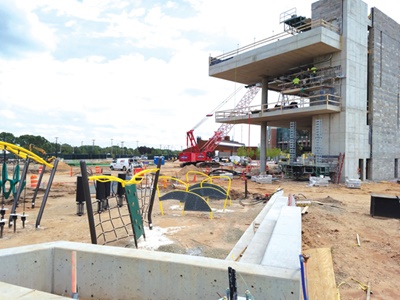 |
Work continues on the tubing hill and a two-story building with a restaurant that will sit beneath it.
Photo by: DANIEL KAPLAN / STAFF |
Tressler’s neighbor, the Lodge Kohler, opened last month and boasts a spa and touch-screen shower fixtures in every room. Kohler, a name firmly ingrained in the state’s business and political history, has long been known for bathroom fixtures, but more recently has become associated with high-end golf courses and hotels. Asked why it chose Green Bay for its fourth hotel over more populous locales, the company’s answer is similar to the brewer’s.
“We are in the heart of the action,” said Christine Loose, group director of lodging at Kohler. “Titletown will be special.”
The hotel has rooms and suites that overlook Lambeau, each with its own Packers photos. A small Packers memorabilia display is in the café. Game weeks will mean big business, but Loose is confident the Titletown allure will attract customers year-round, and said that in the early days of operation the 144 rooms were nearly sold out.
Just behind the hotel is the newly opened $20 million Bellin Health Titletown Sports Medicine facility, the third and final tenant of Titletown’s phase one and whose aim is to be the premier orthopedic facility in the Midwest. Bellin, a Packers sponsor and medical provider, lured Dr. Robert Anderson, an all-star orthopedist after 18 years with the Carolina Panthers.
“The Packers allow us to influence the population now to have a positive health effect,” said George Kerwin, president and CEO of Bellin Health, talking after the ribbon-cutting opening the clinic.
Only the Packers connection, he said, makes it possible to envision becoming the Midwest’s No. 1 orthopedic center in a city of 100,000 with a small airport.
Recreation as a centerpiece
Titletown may already offer great beer, rooms and health care, but the star is 60 feet tall and 45 feet wide with a 30-degree slope. Sometime in November, a national TV audience is likely to get its first look of a broadcaster atop what may be the largest man-made snow tubing hill.
The hill is wired so broadcasters can have remotes and, yes, shots of well-known personalities taking a ride.
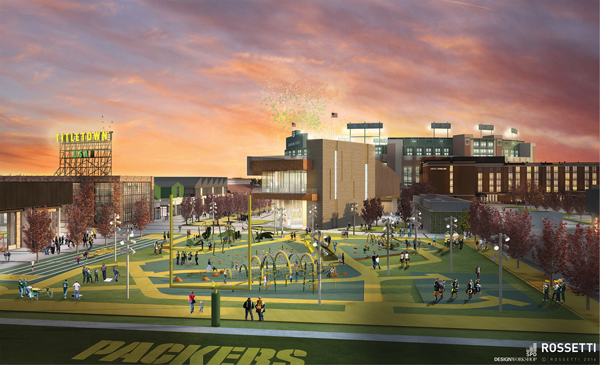 |
Much of Titletown is dedicated to public gathering spots and recreational spaces, such as the football-themed park (above) and the skating loop (below).
Photo by: GREEN BAY PACKERS |
Despite Green Bay’s reputation as a cold-weather outdoor hot spot, so to speak, the city does not offer many communal gathering spots outdoors, said Murphy, the Packers president. That’s why so much of Titletown’s acres are dedicated to the public park and plaza. There will be a playground, a football field, an NHL-size skating rink, a skating trail and concert areas.
Turnkey Sports Poll
The following are results of the Turnkey Sports Poll taken in August. The survey covered more than 2,000 senior-level sports industry executives spanning professional and college sports.
But the tubing hill is the wow-factor centerpiece, one that may soon even have its own sponsor, whose logo would adorn the tubes as well. (Murphy said he dismissed putting the Packers logo on them for fear fans might not return them.)
A building “inside” the hill will have two floors, the first a café and the upper a meeting space. The Packers initially planned a smaller hill, but the team realized it needed something really fun to get young people out, Policy said. When the plans changed, he recalled his days in New York when he would picnic with his young son in Lincoln Square Plaza on a small grass hill that climbs up the side of a restaurant. That memory became in part the inspiration to build inside the hill.
Who gets the first ride down is still a matter of debate, though Policy and Murphy think it should be a player. A contest is still possible, though children of executives have eagerly thrown their names into the hat.
Phase 2
“That’s a good question,” Murphy replied when asked when Titletown will be done. He settled on four or five more years, with the plans including one office and one residential tower, stores, townhouses for up to 400 residents, and yet-to-be-determined features (a zip line is still under consideration). The team is in discussions with other real estate entities to handle leasing for the second phase.
The team’s ambitions are also bigger than Titletown. A short drive from the end of the parcel on the side not facing the stadium is an outlet of outdoor specialist Cabela’s.
The Packers own that piece of land and lured Cabela’s, even though out of the chain’s roughly 50 stores, Green Bay is the smallest market. Now, Policy envisions filling the land between Cabela’s and Titletown, which while not as desultory as what used to lie across the street from the stadium, certainly is not high end.
“Once our development is complete, economics will dictate that it gets redeveloped,” Policy said.
The city has already begun discussions about development on the other end of Lambeau Field, and the team is ready to help out there as well.
So, can the Packers redevelop Green Bay? The team’s future in the smallest market in the NFL might depend on it.
“Hopefully,” Murphy said, “this will allow the Green Bay economic base to become strong enough to support an NFL team at a high level.”




